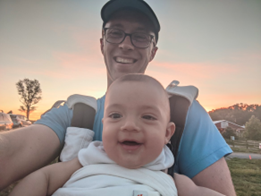Behind the Scenes with Alex Nichols-Vinueza, Program Manager, Food Loss & Waste
- Date: 23 June 2022
In our Behind the Scenes series we speak to WWF staff to learn more about their work and what makes them tick. For today's post, we caught up with Alex Nichols-Vinueza, Program Manager, Food Loss & Waste on WWF's Food team.

Describe your role for WWF and what a typical day looks like.
I work on our Food Waste team at WWF, where I support our incredible team to help halve food loss and waste across our supply chain by 2030 (with farmers, food companies, governments, schools, and community partners). Most of my days are spent meeting with these partners, coordinating across our internal teams at WWF, and then going into the field whenever I can to help implement our work. It’s an issue that’s easy to be passionate about, because it’s intuitive for individuals to understand and take action on, and a very non-controversial solution to help tackle climate change and the massive footprint of our food system.
What are you currently reading or watching on TV?
These days, I just need some comic relief, so I mainly watch Netflix comedy specials or painfully hilarious shows like Nathan for You or Curb Your Enthusiasm. For books, I’m mainly listening to audiobooks while I push a stroller or walk the dogs, and I recently finished Devil in the Grove (on the early career of Thurgood Marshall) and Brave Companions by David McCoullough. The latter is a great collection of short stories on individuals who’ve sought to better understand nature (like Alexander von Humboldt) or protect it (such as a lawyer and photographer in Appalachia).
What brings you joy outside of work?
Without question, it’s my family. Our kids are at such a fun age right now; they crack me up and re-energize me in the face of everything happening in the world today. That said, we have a full house, and I also enjoy the early mornings before the madness begins. We’re lucky in DC to have so many species of native and migratory birds to wake up to, and I love to get up and go walk the dogs, bake, or play in my early morning Saturday soccer league.
What previous experience have you had that led you to WWF, educational or professional?
It’s funny to look back and see how I arrived at this job. I started out working in the food system (in cafeterias, restaurants, on cherry farms) and then nonprofits (teaching English in rural Mexico and interning at a community law clinic that served migrant families in southeast Michigan). After graduating from college with a degree in Spanish and business, I spent several years in consulting at Deloitte to pursue my interest in sustainability, and then nearly a decade managing strategic relationships at Google and Box in their US and Latin America offices. When my daughter was born, I decided to go back to school part-time to get my master’s at Duke’s Nicholas School of the Environment. This led me to EDF and then WWF, where I now feel very lucky to have the chance to pull so much of my past experience and help build coalitions across the food system.
Describe your favorite moment in nature. Be as descriptive as you’d like.
When I graduated from high-school, my dad took me camping to Yellowstone National Park. I grew up in Michigan, spending much of my time outdoors, but that couldn’t hold a candle to sleeping in the mountains at night by the fire, the stars seemingly right on top of you, and then waking up to see bison, wolves, bears, and countless other animals—it was spectacular. My goal is pay this forward and do the same trip with my kids and nieces/nephews once they’re older.
What advice would you give a young professional who is interested in sustainability?
Be persistent and remember that you don’t need a conventional background in this field to make an impact. My path to working in sustainability was very long and unconventional, which was frustrating at times, but also valuable. I don’t think I’m unique in this regard either, so no matter your title, or the organization you’re at to start, focus on how to work with all kinds of people, to learn their motivations and communication styles, and to build consensus. Given the enormity of the sustainability challenges in front of us, the ability to empathize and develop coalitions will be as critical as having expertise in any one environmental field.
What does the future of sustainable business look like to you?
I’m optimistic that sustainable business will simply become business as usual, especially when it comes to transparency and reporting. You’re seeing investors, regulators, and customers (via SASB, TCFD, SBTi, the EU, etc.) all increasingly expecting companies to disclose their supply chain’s environmental and social impacts. Another trend that gives me hope is how MBA programs are shifting towards sustainability. Even five years ago when I was looking at schools, most only had one token student club or class on sustainability, whereas now, when I talk to grad students, it’s often the primary focus of their program. As these students move into the workforce, it will drive further accountability and change from within organizations.